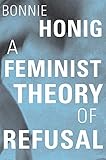A Feminist Theory of Refusal / Bonnie Honig.
Material type: TextSeries: Mary Flexner Lectures of Bryn Mawr CollegePublisher: Cambridge, MA : Harvard University Press, [2021]Copyright date: ©2021Description: 1 online resource (240 p.)Content type:
TextSeries: Mary Flexner Lectures of Bryn Mawr CollegePublisher: Cambridge, MA : Harvard University Press, [2021]Copyright date: ©2021Description: 1 online resource (240 p.)Content type: - 9780674248496
- 9780674259249
- Autonomy
- Feminist theory
- Justice, Administration of -- Political aspects
- Political participation
- SOCIAL SCIENCE / Feminism & Feminist Theory
- Agamben
- Antigone
- Arendt
- Bacchae
- Bartleby
- Butler
- Cavarero
- Euripides
- Fabulation
- Gender
- Inclination
- Inoperativity
- Modern Times
- Muhammad Ali
- Refusal
- Saidiya Hartman
- Sara Ahmed
- Sexuality
- The Fits
- civil disobedience
- conscientious objection
- regicide
- 305.42 23
- HQ1190 .H667 2021
- online - DeGruyter
| Item type | Current library | Call number | URL | Status | Notes | Barcode | |
|---|---|---|---|---|---|---|---|
 eBook
eBook
|
Biblioteca "Angelicum" Pont. Univ. S.Tommaso d'Aquino Nuvola online | online - DeGruyter (Browse shelf(Opens below)) | Online access | Not for loan (Accesso limitato) | Accesso per gli utenti autorizzati / Access for authorized users | (dgr)9780674259249 |
Frontmatter -- Contents -- Preface -- Introduction: The Bacchae’s Arc of Refusal and the Tragedy of the City -- CHAPTER 1 Inoperativity and the Power of Assembly: Agamben with Butler -- CHAPTER 2 Inclination and the Work of Dis/orientation: Cavarero with Ahmed -- CHAPTER 3 Fabulation and the Right to the City: Hartman with Arendt -- Conclusion: Sister Is an Anagram for Resist -- Appendix -- Notes -- Acknowledgments -- Index
restricted access online access with authorization star
http://purl.org/coar/access_right/c_16ec
An acclaimed political theorist offers a fresh, interdisciplinary analysis of the politics of refusal, highlighting the promise of a feminist politics that does not simply withdraw from the status quo but also transforms it. The Bacchae, Euripides’s fifth-century tragedy, famously depicts the wine god Dionysus and the women who follow him as indolent, drunken, mad. But Bonnie Honig sees the women differently. They reject work, not out of laziness, but because they have had enough of women’s routine obedience. Later they escape prison, leave the city of Thebes, explore alternative lifestyles, kill the king, and then return to claim the city. Their “arc of refusal,” Honig argues, can inspire a new feminist politics of refusal. Refusal, the withdrawal from unjust political and economic systems, is a key theme in political philosophy. Its best-known literary avatar is Herman Melville’s Bartleby, whose response to every request is, “I prefer not to.” A feminist politics of refusal, by contrast, cannot simply decline to participate in the machinations of power. Honig argues that a feminist refusal aims at transformation and, ultimately, self-governance. Withdrawal is a first step, not the end game. Rethinking the concepts of refusal in the work of Giorgio Agamben, Adriana Cavarero, and Saidiya Hartman, Honig places collective efforts toward self-governance at refusal’s core and, in doing so, invigorates discourse on civil and uncivil disobedience. She seeks new protagonists in film, art, and in historical and fictional figures including Sophocles’s Antigone, Ovid’s Procne, Charlie Chaplin’s Tramp, Leonardo da Vinci’s Madonna, and Muhammad Ali. Rather than decline the corruptions of politics, these agents of refusal join the women of Thebes first in saying no and then in risking to undertake transformative action.
Mode of access: Internet via World Wide Web.
In English.
Description based on online resource; title from PDF title page (publisher's Web site, viewed 01. Dez 2022)


